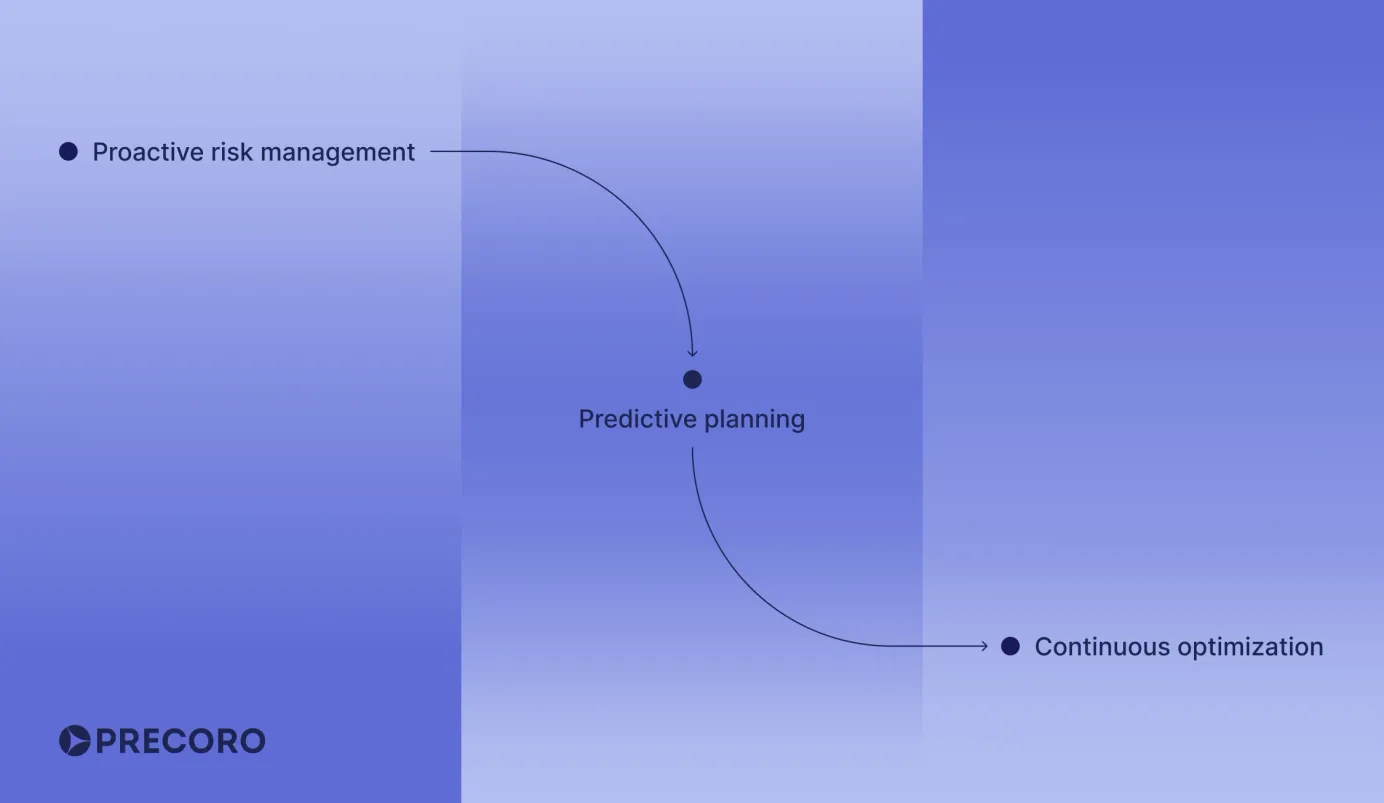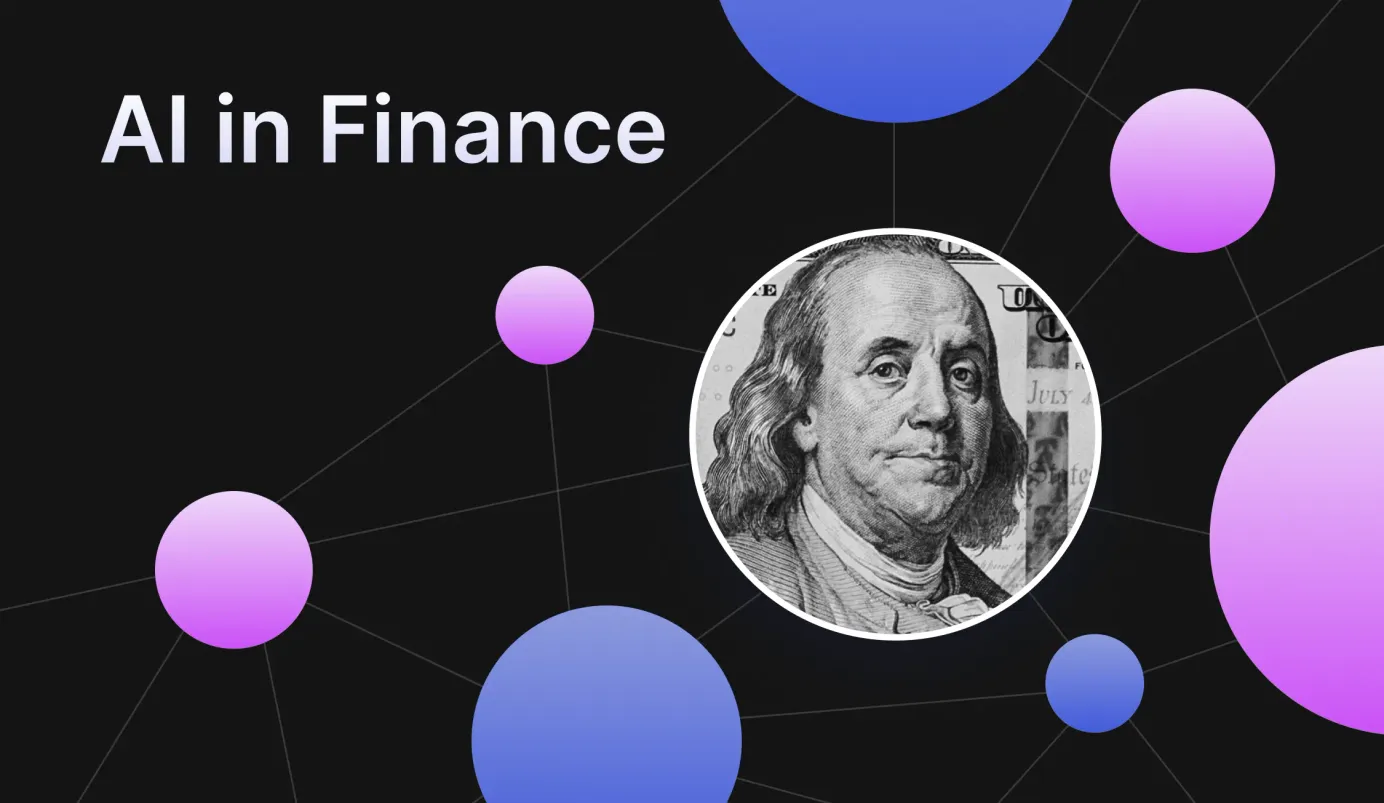
17 min read
AI in Finance: How AI Tools Reshape the CFO’s Role
Discover how AI in finance is reshaping executive roles and what leaders can do to navigate the shift smoothly.
CFOs have always kept a tight grip on corporate finances and acted as both treasurer and strategist. Enter generative artificial intelligence (AI)—an advanced tool that analyzes data and delivers proactive solutions to complex problems. With the rise of AI in finance, CFOs are expected to not just oversee existing financial procedures but also automate them.
AI for CFOs shifts finance from reactive reporting to proactive, strategic leadership. It enables more informed and timely decisions by automating routine tasks, delivering real-time insights, and supporting predictive analytics. This evolution moves finance teams beyond traditional back-office roles into strategic partners for the CEO.
What’s the catch? Although promising, AI adoption poses several new challenges for CFOs, which makes them reluctant to ride the wave of innovation. In 2024, only 9% of CFOs used generative AI. How can companies balance the adoption of new technologies and the human role of the CFO? In this article, we explore the main use cases of AI in finance, its benefits and challenges, and the steps for the successful implementation of AI for CFOs.
Keep reading to find out:
What Is AI in Finance?
AI Use Cases in Finance
How AI in Finance Benefits Your Company
Why CFOs Are Reluctant to Adopt AI
Best AI Tools for Finance
Roadmap to AI Adoption in Your Company
Frequently Asked Questions
What Is AI in Finance?
Artificial intelligence in finance refers to tools used to optimize financial processes. Its applications span from data analysis and risk forecasting to support assistants that mimic human interaction. AI can automate workflows and free up precious time for more strategic tasks in financial departments, which are still reliant on endless Excel tabs.
Traditional vs. Generative AI in Finance
AI comes in two main forms: traditional and generative. Traditional AI uses historical data and learned patterns to calculate and analyze data. Its scope is limited to tasks it’s been explicitly trained to do.
Traditional AI in finance is usually represented by machine-learning tools like clustering algorithms, anomaly detection, and rule-based systems. For example, AI anomaly detection helps procurement teams monitor expenses and flag transactions outside the established patterns.
Until the generative AI boom in the 2020s, traditional AI was king. Generative AI doesn’t just rely on learned data and pattern recognition. This type of AI generates new insights, content, and solutions based on existing data. Generative AI in finance supports functions like financial reporting, employee training, and strategic decision-making.
The type of AI doesn’t matter, however. At its core, AI shouldn’t be a cure-all for all financial challenges at your organization. It’s primarily a tool and an enabler—most effective in the hands of a skilled leader at the helm of the operation.
AI Use Cases in Finance
The broad applicability of generative AI makes it especially appealing to CFOs. By design, generative AI serves three purposes: automation, augmentation, and acceleration.
- Automation: AI takes on repetitive, time-consuming tasks—like drafting reports or filling out invoices—which frees up employees to tackle work that actually moves the needle.
- Augmentation: AI boosts productivity and transforms chaos into clarity. It sifts through scattered data and distills it into concise summaries for data-driven decision-making.
- Acceleration: AI speeds up workflows and cuts time spent on tedious processes like financial reporting. With AI, organizations are also always ahead of the competition in the innovation race.
On average, financial leaders implement AI in six use cases. Here are the key areas where AI for CFOs is making a difference.
Financial Planning and Analysis
Financial Planning and Analysis (FP&A) covers an extensive range of financial functions, from budget and scenario planning to financial modeling and forecasting. It’s a set of planning, budgeting, and forecasting activities that support the business.
FP&A teams are often snowed in with manual work, such as filling out spreadsheets and updating reports, and AI tools for CFOs can help with that. Let’s take a look at some functions CFOs can delegate to AI in FP&A processes:
Data Consolidation
Companies turn to artificial procurement intelligence to automate the tedious process of gathering fragmented data, often located across several resources. Data management is the foundation of all steps in FP&A—get it wrong and the entire house of cards might fall over. Whether it’s internal data from ERP systems or information from industry reports, consolidated AI tools with broad data access can standardize, verify, and compile multiple datasets in one system.
Financial Forecasting
More often than not, FP&A analysts invest in AI for finance to predict how the business will perform based on historical data. In particular, AI has completely reshaped predictive analytics. Companies no longer need to pore over countless reports to determine how much sales they might make this season. AI does that work for them: artificial intelligence in finance analyzes past sales data, identifies patterns, and creates a precise prediction report.
In addition, if you’re not sure why the sales dropped in the last few months, AI can conduct regression analysis. To do this, AI uses the provided data to determine a possible relationship between declining sales and other factors.
Scenario Planning
A huge part of FP&A is planning for uncertainties and unforeseen circumstances that might disrupt your company's operations. Generative AI can process tons of internal and external data, highlight potential gaps, and develop scenarios for possible outcomes in case of inaction. If prompted, AI can develop specific scenarios, analyze trends, and even generate a possible strategy the planning team can use as a reference.
Financial Modeling
AI especially comes in handy in labor-intensive use cases like financial modeling. Financial modeling refers to a forecast of all financial data with possible outcomes for different scenarios. Traditional financial models are built on spreadsheets and based on a massive amount of data, including income and cash flow statements, balance sheets, and supporting schedules.
Dedicated financial modeling AI tools completely change the game. With advanced algorithms, AI calculates the data, identifies correlations unseen by the human eye, and offers a higher-level analysis. Similar to how an AI image generator can rapidly create complex visuals from simple inputs, these financial tools quickly turn raw data into meaningful insights. Such tools are adaptable—instead of re-entering the data every time, you can set up automated data sync with real-time updates from several sources.
Procurement
CFOs are the key decision-makers in the company’s procurement processes. Their expertise, combined with AI for finance, can help make faster purchasing decisions that align with the company’s financial goals. With AI, CFOs and procurement managers can:
- Manage spend and improve cost control. AI-powered spend management platforms can track spend patterns and quickly spot any signs of overspending. If any unapproved purchases happen, AI alerts the relevant teams. On top of that, AI tools for finance can suggest where to cut or reallocate funds for more efficient cost management.
- Automate invoice and purchase order creation. Traditional purchase order and invoice processing often requires a lot of manual work. Miss one number and the entire transaction falls through. For example, while traditional OCR merely extracts raw text from documents, Precoro uses AI to understand the document's layout and context. That's how the system pulls vendor names, prices, and other key details with 95%+ accuracy to quickly generate ready-to-use invoices. If users want extra assurance, Precoro’s product team can double-check pre-filled invoices.
- Organize and classify data. AI can take a large amount of data and categorize it by supplier, item type, location, or department. What could have taken hours takes seconds, with teams focusing on tasks that require actual human expertise.
- Empower customer support with AI-powered assistants. Round-the-clock support sounds great, but it’s not always realistic. That’s where AI chatbots can help. If a customer has trouble with the product, such tools can guide them to a quick solution outside business hours.
If you want to learn more, this article talks in-depth about the role of AI in procurement.

Market Monitoring
Without a proper research strategy, you’re staying in the dark. As a leader, the CFO needs to be aware of market trends and industry innovations that can impact the company's financial performance.
Therefore, it’s no surprise that AI in the finance field boasts numerous offerings of market research and competitor monitoring tools. They scour external content sources for relevant trends and patterns, compile them into a well-structured report, and provide helpful insights.
For example, AI-powered sentiment analysis (an assessment of investor mood about a certain stock or the stock market) can spot shifts in market sentiment early on. As a result, CFOs can make informed risk-related or investment decisions.
Fraud & Anomaly Detection
AI in finance is often used to identify discrepancies or inconsistencies in financial data. AI first processes the provided information, then analyzes patterns via machine learning, and finally tracks any data anomalies or suspicious activity. Three- or two-way matching is a great example of AI anomaly detection. Precoro, for instance, compares invoices, receipts, and purchase orders to confirm that the information matches across all documents and companies pay only verified invoices.
Financial and ESG Reporting
Employees no longer need to spend hours on paperwork to compile a report—72% of companies are already experimenting with AI in financial reporting and audit. The number is estimated to rise to 99% in three years. No wonder—AI has completely revolutionized the way organizations approach reporting.
To create a ready-to-use report, generative AI sifts through data, verifies it according to pre-set compliance and industry checks, analyzes it, and compiles it into an accessible report. For instance, with Precoro, you can create custom reports based on dates, items, and custom fields entered in the system.
Moreover, although ESG is no longer a top priority for businesses in 2025, CSDR reporting is still mandatory for some companies in the EU. To keep up with regulations, generative AI collects fragmented data, processes it with OCR to remain accurate, and stores it in one place. ESG and CSDR questionnaires are famously long-winded, but AI can cross-reference available data and pre-fill the answers. Additionally, some tools automatically adjust reporting data when any regulations change.
Working Capital Management
One of the key responsibilities of any CFO is managing the working capital—the funds and resources that keep the business running. This term essentially covers all the main financial functions of the company, such as accounts payable, accounts receivable, and cash flow. It’s all about balance: you need to ensure the company covers all short-term needs and allocates money to growth investments.
Generative AI solutions for finance use predictive analytics and machine learning to forecast cash flow patterns and automate accounts payable. For instance, Precoro recognizes complex invoice patterns with Google's AI-powered custom extractor. The OCR extracts key data and auto-completes invoice fields, which reduces the invoice processing time for the AP team.
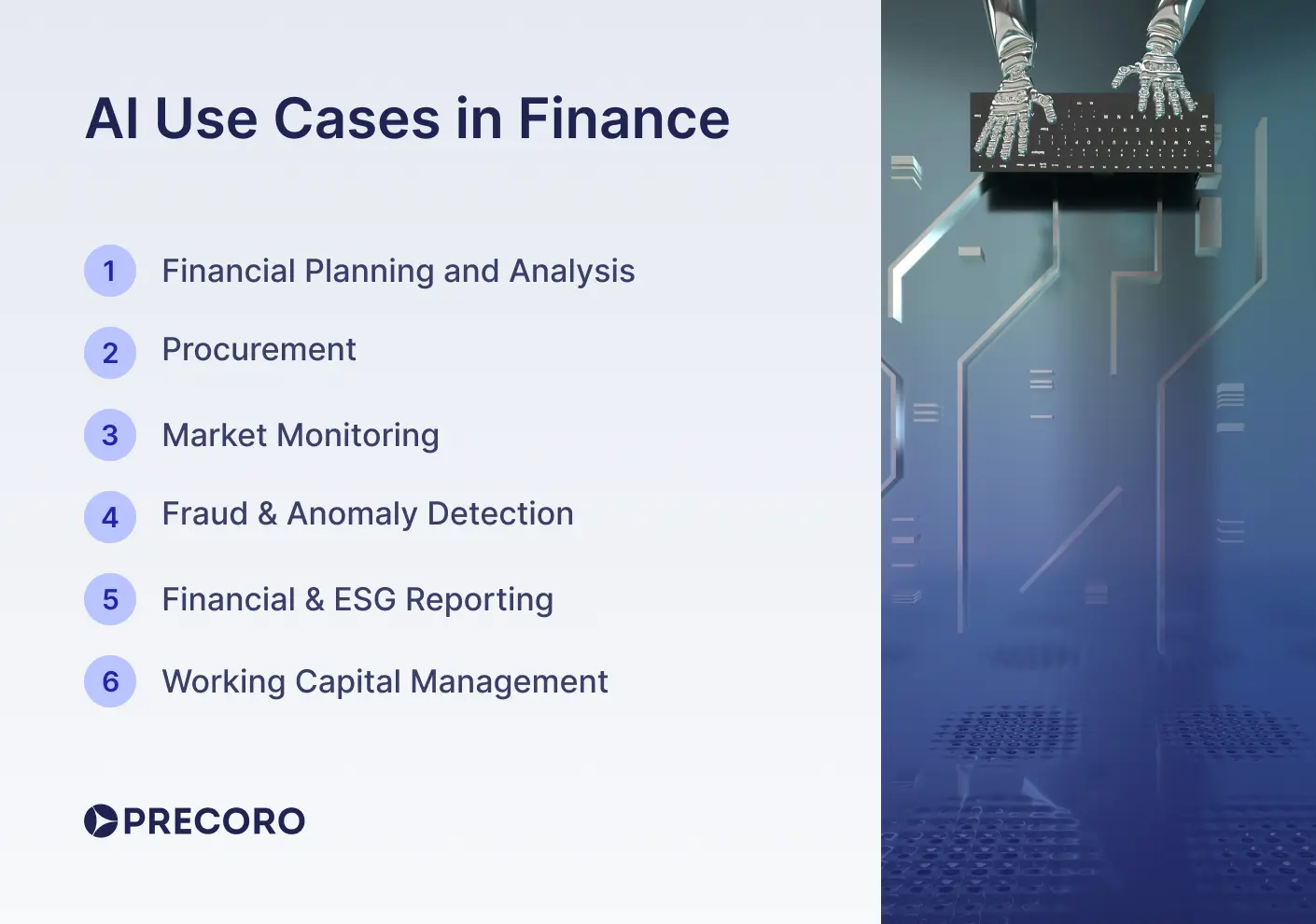
How AI in Finance Benefits Your Company
AI implementation usually begins in the CFO’s office and for a good reason. Here’s how AI solutions for finance can transform your company’s financial operations from the ground up:
Greater Accuracy with Fewer Errors
There’s no arguing that we as human beings are prone to making mistakes. Routine, mindless tasks like updating spreadsheets or copying information from one document to another are especially vulnerable. A study found that around 94% of business spreadsheets contain errors, mainly because they are handled by non-trained personnel instead of IT professionals.
Provided that the generative AI finance model is well-trained and has sufficient data, it can perform tasks with much higher accuracy. For instance, it can make precise calculations in financial reports, conduct spend analysis, and validate data across documents.
Enhanced Data Management
Struggling with organizing your financial information? Have to switch between your browser, Power BI, and email to view several documents? Data is notoriously fragile and easy to lose in a chaos of folders and Excel tabs. Businesses often struggle with data silos—information that is available only in one department and inaccessible to the rest of the company.
Solution? Invest in centralized AI tools for finance, which can extract data from internal and external sources, like ERP systems, procurement software, accounting tools, etc. With machine learning and adaptive filtering, such platforms sort data, replace outdated records, and flag anomalies.
Time and Resource Savings
Time is money—there’s no arguing that. AI is known for being a time-saver: tasks like reconciliation and expense categorization that take days for teams to complete can be done in minutes. Additionally, when tools handle rule-based work, employees can focus on higher-value work, which actually requires human expertise and adds value to the company.
Faster Decision-Making
The financial field is often a high-stakes environment, which means each decision made by financial leaders has to be carefully weighed. AI tools for CFOs can use predictive analytics to deliver invaluable insights into market conditions, customer behavior, and investor sentiment.
AI and finance can work together. Natural Language Processing (NLP) can analyze unstructured data like social media, news articles, and profit reports, while AI finance chatbots provide instant access to financial advice and personalized strategies. Together, AI for CFOs can help leaders make faster and more informed decisions.
Increased and New Revenue
AI in finance is still largely viewed as a tool for cost reduction and automation of mundane procurement processes. Its revenue potential remains untapped to some leaders, despite almost 70% of companies reporting gains of 5% and more after AI implementation. AI solutions for CFOs can analyze product demand and competitor pricing, after which you can set dynamic pricing for services or explore an unexplored market.
Businesses can also offer personalized customer service through an AI finance assistant. They can upsell services and offer add-ons to standard products. It’s a win-win: customers receive a tailored experience that meets their needs, while the business earns more.
Proactive Risk Management
CFOs often have to be the brains behind the strategies against countless threats to the company's financial well-being. Operational failures, fraud incidents, market shocks—the list goes on. Juggling all of these external and internal risks can be tough.
AI can lighten the burden with its generative and machine learning capabilities. Given proper data, AI in finance can detect maverick spend, predict budget overruns through a spend analysis, and assess supplier profiles for compliance and performance issues.
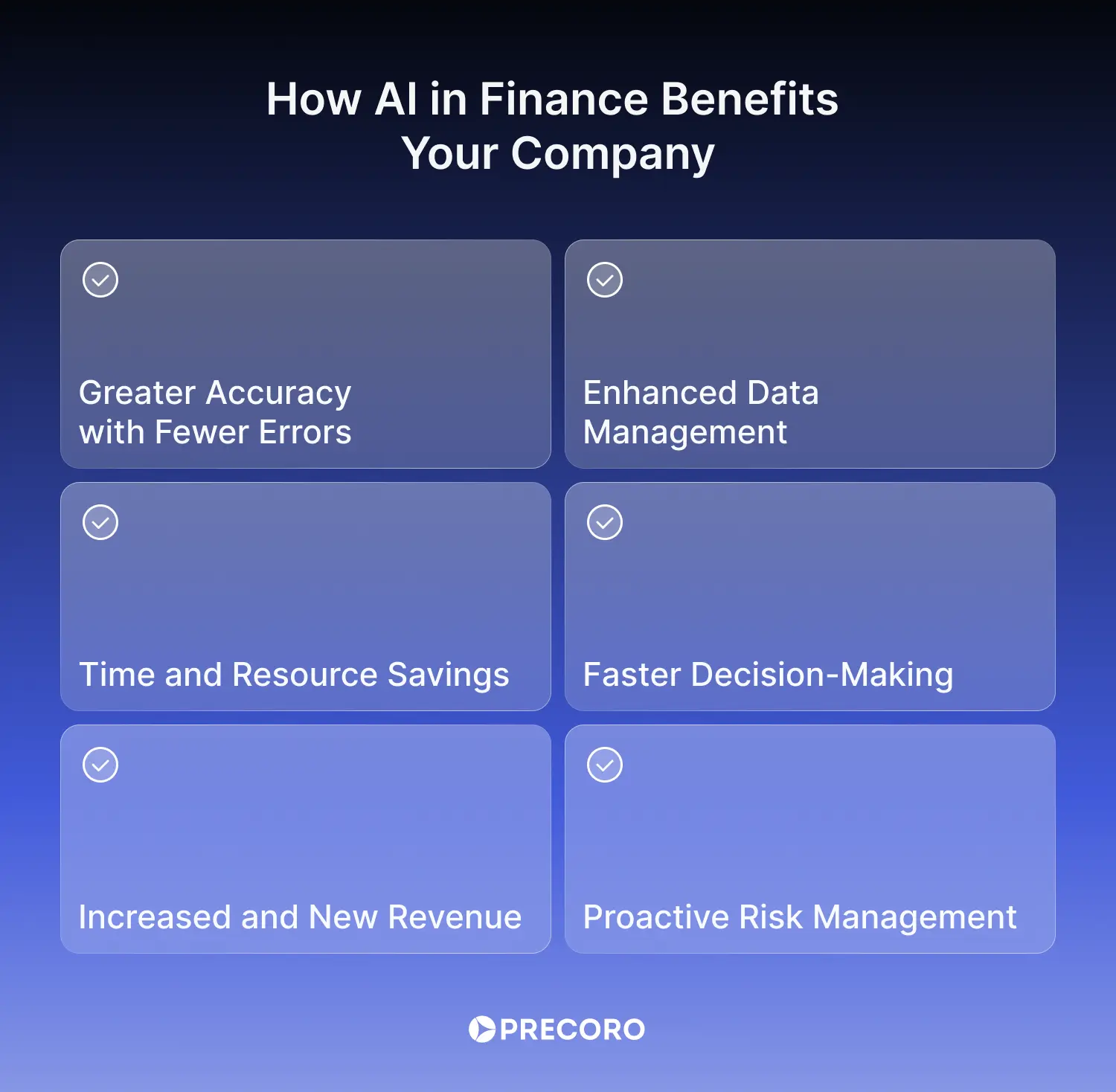
Why CFOs Are Reluctant to Adopt AI
Despite the promising benefits of AI adoption, CFOs are hesitant to actively integrate it into their processes. A study by Deloitte and the Institute of Management Accountants (IMA) revealed that only 9% of 900 respondents actively use AI in their organizations. In comparison, 38% don’t have any plans to adopt it. What could be the reason? Let’s look at some factors that push CFOs away from AI tools for finance.
Cost and Pricing
The upfront cost of generative AI in finance can be pretty steep, with custom AI applications setting companies back thousands of dollars. 4 out of 10 CFOs are unsure whether the benefits outweigh the risks.
Additionally, the new tool requires more resources, be it upgraded infrastructure, training, or cybersecurity measures. The rising costs can seem daunting, especially if AI's return on investment (ROI) is not immediate or guaranteed.
Challenging Integration and Adoption
Bringing new software into an established company ecosystem is always tricky. Legacy systems are often too outdated to support AI finance tools; replacing them means more time spent on an upgrade. That’s not all—employees need to go through the training and onboarding process, while the software needs to be updated and tailored to the organization’s needs. All these disruptions cost time, and time is money.
Data Privacy
Although data security is not the primary specialty of the CFO, financial leaders are understandably cautious about the leak of sensitive information. Open-access AI products like ChatGPT cause the most concern. Executives worry that if an employee uploads confidential data into ChatGPT, it might be shared with other users. To prevent this, companies rely on custom in-house AI solutions or implement AI finance regulations for employees.
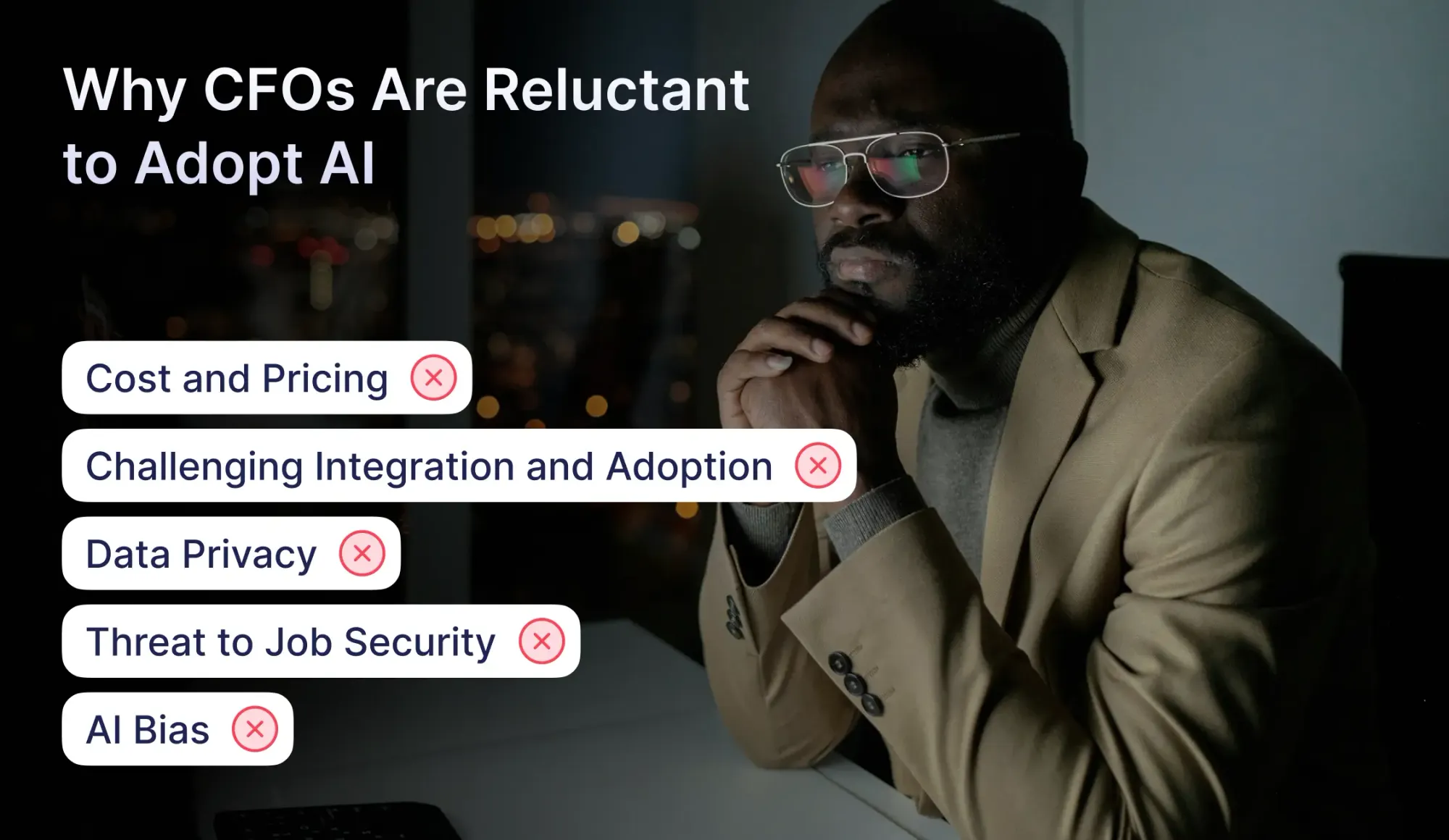
Threat to Job Security
Debates on AI replacing human workers began long before the first generative AI solutions hit the market. The increased use of artificial intelligence in finance and corporate settings only fueled these discussions. The concern is valid: some employees feel threatened when most of their responsibilities can be done by a machine. Even CFOs don’t feel safe, with a traditional CFO role expected to transform into an AI-augmented Chief Capital Officer position.
AI Bias
Also known as an algorithm bias, AI bias happens when human biases influence the training data of the AI model. The resulting outputs are then inherently skewed and can harm all parties of the interaction, be it the customer or the company itself. For example, if the training data was biased, AI designed for supplier sourcing might prioritize suppliers from a particular region with more experience. Thus, the model completely overlooks newer vendors from other regions, which can raise ethical concerns.
Best AI Tools for Finance
New AI-driven platforms pop up on the market daily, with existing software adding artificial intelligence features to its toolkit. To make your search easier, here are a few useful AI tools for CFOs:
Precoro

Precoro is an artificial intelligence procurement software with ML capabilities. The cloud-based platform’s standout feature is its AI-powered OCR, which simplifies invoice processing. Precoro helps teams from various industries, from solar power producers to bank institutions, automate their purchasing process and centralize all procurement-related data. The procurement system serves the needs of businesses in the Netherlands, Portugal, Switzerland, and many other countries. Here are some of the AI functionalities leaders can use:
- Google’s AI-powered custom extractor to precisely capture critical information. Equipped with contextual understanding, OCR automatically pre-fills required fields and generates a complete invoice.
- Three- or two-way matching of invoices with receipts or POs to ensure accurate data.
- Custom reports based on dates, suppliers, or any custom fields you create.
- Automatic purchase order creation from purchase requisitions in just a few clicks.
- Autofill feature that uses previously entered information (e.g., suppliers, addresses, or payment terms).
- Multilingual OCR support in English, German, French, Turkish, Norwegian, Dutch, and Chinese. If you want another language, the system can be trained.
Power BI

Microsoft’s Power BI, a business intelligence tool, helps companies organize, visualize, and draw insights from their data. The platform boasts its own AI for CFO capabilities:
- Automatic pattern detection. With AI algorithms, Power BI detects anomalies and discrepancies in datasets.
- Predictive analytics. The system offers AI insights based on historical data, such as sales forecasting.
- Self-training with ML. The tool can learn based on provided data and develop a more accurate analytical model.
Pro tip! Set up an automatic data transfer between Precoro and Power BI with the built-in integration.
Similar tools to check out: Domo, ThoughtSpot, Sisense
Vectra AI

Vectra AI is an advanced cybersecurity tool that helps catch network threats early on. The platform integrates with the company’s existing applications and data centers and alerts users of data breaches and attacks. As an AI tool for CFO, Vectra AI boasts the following features:
- Machine learning detects threats in real time and prioritizes them based on severity and certainty.
- AI filters out false positives and alerts teams only to risks that are actually valid.
- Uses large language models (LLMs) to analyze datasets and past cybersecurity incidents.
Similar tools to check out: Darktrace
Sage Copilot

One of the more recent AI for CFO developments, Sage Copilot is an advanced generative AI productivity assistant for SMBs designed to automate and simplify key financial tasks. Its parent platform, Sage Intacct, provides cloud-based accounting and financial management services. Here are some of the features of this digital assistant:
- Uses NLP to draft professional emails and payment reminders.
- Flags anomalies and regulatory issues.
- Can send invoice reminders in bulk.
- Helps manage accounts payable by automatically creating and sending purchase orders.
Similar tools to check out: Intuit Assist
SymphonyAI
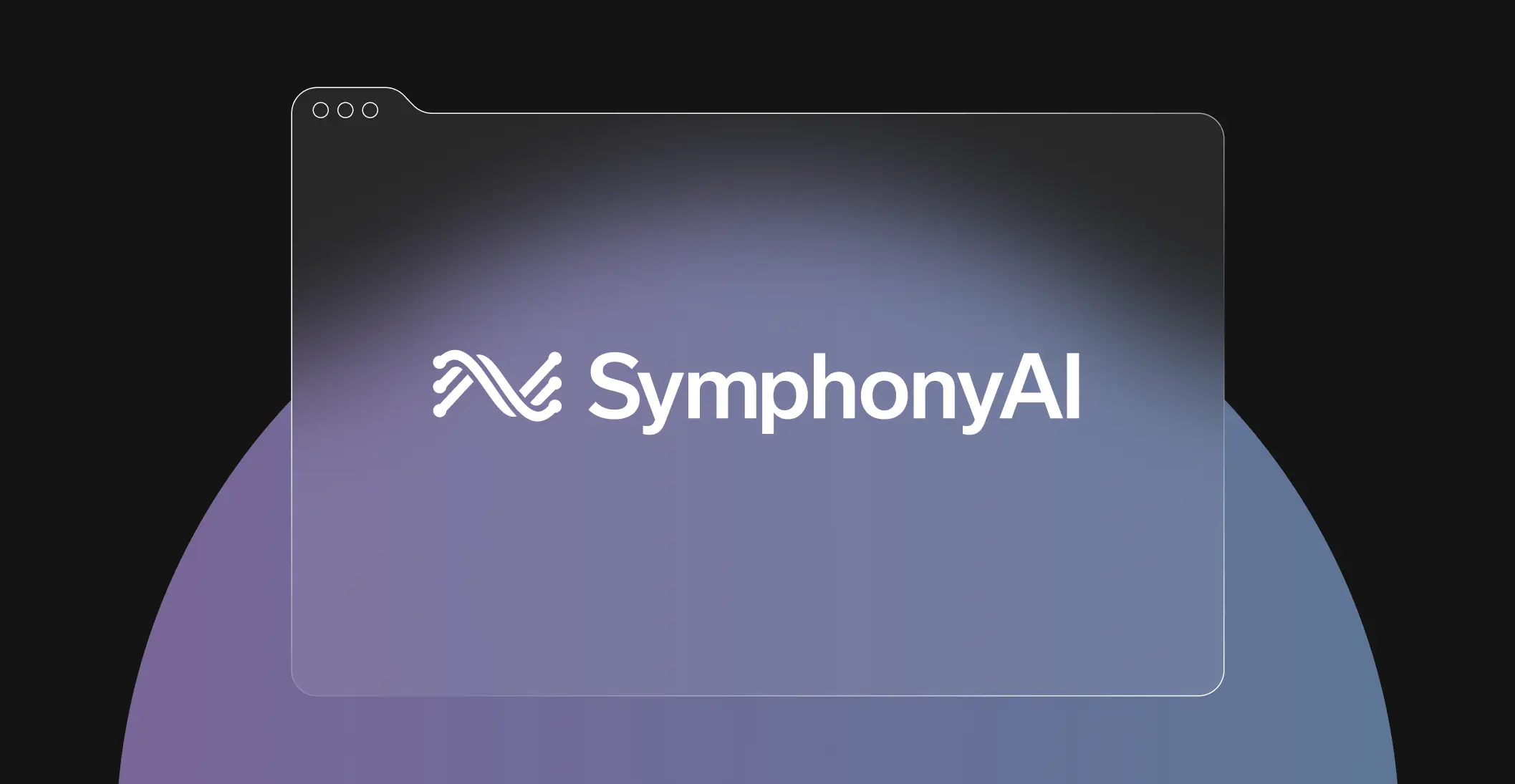
SymphonyAI is an enterprise AI SaaS company that offers tailored AI applications for businesses. Each packaged application targets concerns specific to the industry. This AI solution for finance focuses on fraud, financial crime prevention, and anti-money laundering (AML).
- Detects anomalies and alerts users only to those incidents that require action.
- Conducts risk assessments of potential customers to protect them from unintentional involvement in illegal activity.
- Generates Suspicious Activity Reports (SARs) that comply with financial regulations.
Similar tools to check out: ComplyAdvantage
Roadmap to AI Adoption in Your Company
After weighing all the pros and cons of AI for your organization, one thing is clear—AI solutions for finance aren’t going anywhere. Here are a few tips on how to implement AI without disrupting your business operations.
- Set clear goals and expectations. What do you want to achieve with AI? Before browsing the market for the best AI tools for CFOs, focus on the desired outcomes.
- Involve key employees and stakeholders. People often resist change, especially if it disrupts the usual workflow. Get buy-in from frontline workers who will either work closely with AI or train others to do it.
- Merge AI and finance. Integrate it into a broader financial management strategy. Focus on how a new tool can help improve employee productivity, performance, and overall processes.
- Develop comprehensive AI regulations. From what data employees can input to how they can use AI, ensure the team knows the proper protocol.
- Train employees and offer guidance on AI benefits. Provide additional training if advanced AI tools for finance require it. If employees are unsure about AI, open a discussion on how it can benefit them.
Frequently Asked Questions
AI in finance is primarily used to automate routine processes to free up the team’s time for more strategic initiatives. However, it has other purposes, such as financial forecasting, risk assessment, predictive analytics, and market research.
Each company has different business needs, so there’s no one-size-fits-all AI solution for finance. The market of generative AI for CFO can cover all business needs of your company, from procurement automation to business intelligence. The functionalities differ, but each tool would bring value to financial departments.
AI is more of a tool and an enabler than a threat. The concerns about generative technology replacing human workers and endangering data privacy are completely valid. But AI in finance is meant to be an assistant that reduces workload, boosts productivity, and frees up time for more meaningful work.
No. While AI can do some of the CFO’s work for them, it can’t mimic genuine human expertise and strategic thinking. AI for finance still can’t match human, nuanced decision-making and intuition. The CFO role will likely evolve into a leadership position augmented by AI, where AI takes over administrative tasks and assists in business intelligence.
Both traditional and generative AI are used in finance. Most of the tools on the market capitalize on generative AI capabilities, such as machine learning, natural language processing, and predictive analytics.
Why AI in Finance Matters
The future of finance is here, and AI is the driving force behind it. The possibilities are endless, with AI tools in charge of everything, from procurement and cybersecurity to data management. CFOs across all industries use AI solutions to replace tedious processes and discover data-driven insights. But AI is not just about automation—it can help increase business profitability and open the door to new revenue streams.
What’s next for CFOs? As a financial leader, your job is to lead the change and embrace AI as a strategic ally. Although your responsibilities might change, the focus should always be on how artificial intelligence can help your company achieve its objectives.



